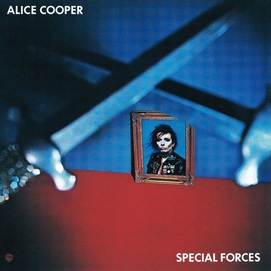
In 2003 I was offered the opportunity to write the liner notes for a planned boxed set of Alice Cooper's discography to-date. Though I did receive an email thanking me for sending in the notes, that was the last I heard. There have been some excellent Alice Cooper boxed sets since then, although not precisely the one envisioned in 2003.
So, I was going through some old files the other day and found the notes. I am a much better writer now. But I still love Alice Cooper, and 12 years later, I figured I'd might as well share them. I haven't edited the language at all. So, enjoy or skip. Maybe even pick up Special Forces and give it a spin—I mean, well, actually that is what I mean.
THE REINCARNATION OF ALICE: Alice Cooper’s Special Forces
Like the devil, like Dracula or a successful politician—like anybody worth getting to know, Alice Cooper has always changed over the course of his tale’s telling. There can be no doubt that the cross-dressing military man of 1981’s Special Forces is one of the strangest and least understood versions of the Alice monster/victim character. But it can be argued that this incarnation and the album he rode in on represents the essence of the Alice Cooper persona perhaps better than any other.
It’s 1981. Alice releases Special Forces. The Cold War continues. Reagan is sworn in as 40th American president. Alice swears he’s “the reincarnation of Patton and I’ve got Hannibal’s heart in my chest.” Reagan appoints a woman to the Supreme Court and that court approves the televising of trials. Alice wears lace stockings and airs it publicly. John Paul II is wounded by a gunman and John Lennon is shot dead. Alice warns of the sociopath who sings “My finger squeezes out the final shot, say good-bye.” Hostages are released from Iran after three cruel months. Not without misgivings, Alice lets the skeletons out of his closet. The artificial heart is approved for human use. Alice introduces the semi-automatic heart, and the truthful edge in his voice convinces you it’s real.
Alice thanks the American Military Corps on the back of the album. On April 26, 1980, President Carter had authorized the use of Special Forces in an attempt to rescue American hostages being held in Tehran, Iran. Unfortunately the operation wasn’t a success. Alice’s mission was. The motto of the Special Forces who carry guns is “To Liberate the Oppressed.” But with his guitar-toting Special Forces, Alice can declare “We Don’t Care” and never fail.
It’s hard to face yourself in the mirror, especially when you look like Alice Cooper. The Coop has been reflecting American Cultural life back at us since Love it to Death and whether or not his country realizes it doesn’t matter (Special Forces only reached 125 on Billboard upon its release). Let’s face it, when Special Forces came out, his country also thought an American Indian, biker, construction worker and police officer hung out together because they liked to sing.
How do we get to know this whip-cracking false eyelash-wearing enigma? Put on the record. He needs a helicopter to carry him down to your speakers because this is an emergency. You need Alice to tell you what’s what and he has to get in there and do his job as quickly as possible. That, and you’re lowlier than him, as he’s about to demonstrate. So naturally he comes from above, stoops to your level, before knocking you senseless and taking off again, leaving you wondering “who was that mascara’d man?”
You think you’re in luck when he starts off asking you to ask him who he and his band are. But then he answers “we don’t care.” Thanks, Alice. Once it’s clear he doesn’t give a damn what you think of him, he spends the rest of the album telling you who he is, again and again. And each time it’s a different autobiography.
A synopsis of these conflicting characters:
In the tone-setting “Who Do You Think We Are” he’s red and white and black and blue machinery who’s done some things he really can’t describe. But there’s no need to describe what they were—with his growling delivery you realize you don’t want to know.
In Love’s “Seven and Seven is,” he’s a ball that goes “Oom pah pah, oom pah pah! Yeah!” (Yeah, I don’t know either . . . but singing along relieves the need for comprehension. You get the feeling “Don’t ask, Don’t tell” was a policy created by Alice specifically for these ferociously bizarre recordings.)
He’s the prettiest cop on the block (and even if he’s not you’re not going to argue). He’s trying to balance his family life with his transvestite law-enforcement gig, a queen on the street and a king at the station.
“Don’t Talk Old to Me” puts Alice on the other side of authority—taking the traditional rock-n-roll stance of rebellion against being told what to do. But Alice’s insurrection is so sure of itself it becomes an authority in itself.
In the raw “Generation Landslide 81’ (Live)” he’s the reincarnation of Alice Cooper from 1973, and his impersonation is far more brutal and all-knowing than the harmonica-playing classic. Alice was notorious for lying to interviewers, and on this track he extends his gift for misinformation to the music, overdubbing a crowd that didn’t exist.
“Skeletons in the Closet” is one of those Alice lyrics that turn cliché inside out, riffing on the title phrase in a literal context with visions of bones in his pajamas and fingers in his coat pockets. (Note for fans of 1975’s Welcome to My Nightmare: The shouted “What? What do you want?” that ends “Skeletons in My Closet” and opens “You Want It, You Got It” is a reference to the last lines of the classic “Steven.”)
In “You Want It, You Got It” he’s a guy who can get you whatever you want, from daily cases of Chateaubriand to love. Anything can be arranged. But he sounds smooth as a compact disc playing at vinyl. Believe at your own risk.
The 1980’s was the decade of expensive designer jeans, and Alice lampoons fashion with ”You Look Good in Rags.” The song can be read as an interesting double-critique, lyrical and musical. It lifts a riff from Blondie’s “Atomic”, released the year before, and where that song was slick and popular as a page of Vogue, this one is a ragged rocker in which the beautiful hair of “Atomic” is stuffed with bones and dirt.
In “You’re a Movie”, he’s a bullet-repelling, big-stick wielding general, calm in the face of battle and commanding five million soldier-sheep to their slaughter.
“Vicious Rumors” is a great fast rocker and in style takes up where “Who Do You Think We Are” left off—like a battle, the album starts and ends with an explosion. Here Alice switches to a second-person point of view, telling you about the tumor in your ear and how your canary might be an F-86 fighter plane, forcing the unpleasant reality on you just because he said so. He’s a brat with power.
So many different Alices, and yet on Special Forces they’re all held together by two things: Great songs and megalomania.
Every anti-hero worth knowing has his beloved themes. The devil plays with sin throughout the centuries. Since “The Ballad of Dwight Fry,” Alice had been consistently exploring an exaggerated madness, a cartoon insanity. With Special Forces Alice continued the tradition, but shifted the madness from characters who were tortured within, like the confessors of School’s Out’s “Looney Tune” or From the Inside’s “Nurse Rozetta,” to a collection of monologues and sketches on how the world is his bitch.
In Special Forces Alice tells us he is the best. The prettiest. The toughest and bravest. That these terms seem contradictory doesn’t bother him in the least. Who gives an oink? How can we be shooting planes down over Libya while drinking margaritas on the Love Boat?
Vocally, Alice ranges from sounding tortured and pissed-off, just plain UGLY, and collected and smooth on “You Want It, You Got It” and “You’re a Movie” where there’s no need for such in-control narrators to shout about their undeniably matchless abilities.
Like the entire work, his band is called “Special Forces” and they play like they’d get court-martialed for lack of energy, reflecting the hectic beat of the post-punk musical scene which Alice first approached on 1980’s Flush the Fashion. On that album he flirted with the “new wave” sound. Here he tears it shreds, like ripping sawdust from the tame teddy bear pop music had become. Guitars are trebly and rip through the speakers in shrapnel bursts. In keeping with the times, guitar solos are kept to a minimum, but when they do occur they’ve got plenty of attitude, as in “Who Do You Think We Are.”
Who was the Special Forces band? They were produced by Richard Podolor (Three Dog Night, Steppenwolf, and Iron Butterfly), and it would be his first and last work for Cooper. Bassist Erik Scott played with longtime Cooper friends Flo & Eddie and went on to co-produce Special Forces follow-up Zipper Catches Skin with Alice. Drummer Craig Kampf had also played with Flo & Eddie. Keyboardist Duane Hitchings went on to write “Do you think I’m Sexy” for Rod Stewart. Rhythm guitarist Mike Pinera played with Iron Butterfly, and lead guitarist Danny Johnson was a whiz who’d put in time with Rick Derringer.
The military drag Alice is the essence of Alice because Alice is the essence of America, and Alice has always been about contradictions: A man with a woman’s name, a victim who is killed and comes back triumphant, and an ugly glamorous rock star. Nothing is more American than a General in woman’s makeup because America, as the land of the freedom of choice, even lets you choose two things at once. Just like Vincent Furnier did.
As “Vicious Rumors” fades, the helicopter returns to pick Alice up. He’s leaving and he doesn’t care what you thought of his performance, and where he’s going is none of your business. If you can’t handle the truth anymore, you don’t have to listen to the record ever again. Because it’s America and because it’s 1981, you have choices. There are some new movies out, for example. Why don’t you go to one of them? You can see My Dinner with Andre—or My Sister Seka.
It doesn’t matter which.
We don’t care.


